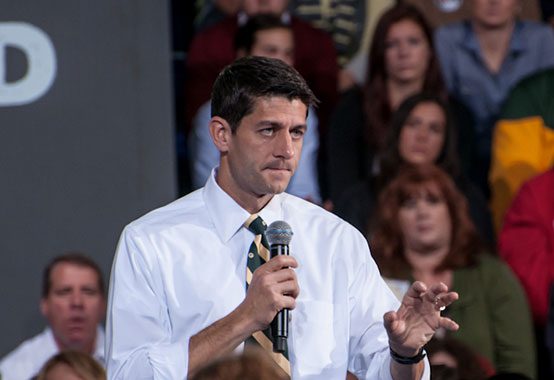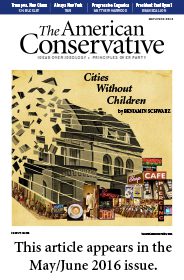No Presidents from Wisconsin

Wisconsin has played a big role in this year’s Republican presidential contest, giving Ted Cruz a victory that boosts his chances of fighting Donald Trump all the way to a contested convention in July. But a year ago, prognosticators imagined even bigger things for the Badger State—specifically, the possibility that its governor, Scott Walker, would be the Republican nominee.
He was, after all, considered a front-runner for half of 2015. His super PACs raised a lot of money, and he was in the upper tier of many polls at the outset. Yet by the time he pulled the plug back in September, his campaign was falling in popular support and was deep in debt. If people were surprised by this turn of events, they shouldn’t have been. Presidencies—and serious presidential candidates, for that matter—just aren’t made in Wisconsin.
Only one Wisconsin politician has headed a major electoral ticket—though Badger Staters like Paul Ryan and Pat Lucey were vice-presidential candidates in 2012 and 1980, respectively—and that was Robert M. La Follette, who was the presidential choice of the Progressive Party back in 1924. Even he never headed a major-party ticket because Republicans and Democrats tend to pick good party people as their nominees, and being a party man was the diametric opposite of La Follette’s inclination. He was about wrecking traditional party organizations, not leading them. As governor of Wisconsin from 1901–06 he enacted laws that weakened party organizations, ended political patronage, and established open primaries, allowing his followers to win nominations and get elected in the state’s dominant Republican Party of that time. It was La Follette, while he was in the U.S. Senate, who inspired a bloc of congressional Republicans in 1911 to dump their own speaker, Joseph Cannon; and it was La Follette who became the first man to challenge a sitting president, William Howard Taft, in a party primary in 1912. Such actions did not make La Follette welcome in elite GOP circles.
La Follette’s hopes of getting the Republican nomination in 1912 or 1916, at the head of the party’s progressive faction, never bore fruit—in part because of his rivalry with Theodore Roosevelt—and he was routed by Calvin Coolidge in the 1924 GOP race. La Follette led a walk-out of the Wisconsin delegation to the Republican National Convention in Cleveland that year, with the remaining Republican delegates singing in almost perfect union:
“Hail, Hail the Gang’s All Here!”
“All except Wisconsin, All except Wisconsin!”
“Hail, Hail the Gang’s All Here!”
“All except Wisconsin, All except Wisconsin!”
The Progressive Party met in Cleveland a short time later to nominate La Follette and Burton K. Wheeler, U.S. senator from Montana, as its ticket. There was hope that the Progressive Party could take enough states to deny President Coolidge and the Democrats’ John W. Davis a majority in the Electoral College and thus force the election into the House of Representatives, where progressive members of both major parties would choose La Follette. While he did carry his home state and finished second in many others in the North and West, to the tune of 17 percent of the popular vote, his candidacy showed once again that progressivism could not exist outside the two-party system. It was a lesson his son Philip, as Wisconsin’s governor in 1938, learned the hard way when he tried to organize a new version of the national Progressive Party, only to watch it crash and burn in that year’s election.
But Robert La Follette’s legacy lived on and has shaped politics in Wisconsin for the rest of the century, especially when it came to voters’ attitudes about their politicians. They wanted them to be mavericks from time to time, not drones or party-line supporters. Thus success locally meant a lack of success nationally. State politicians who were possible presidential candidates but had a tendency to speak their minds or vote against their party colleagues occasionally—men like Sen. William Proxmire, Governor Tommy Thompson, and Sen. Russell Feingold—could never find solid constituencies for themselves within their national parties. (Wisconsin and Minnesota are similar states in population makeup, but from 1964–1984 a member of the Minnesota Democrat-Farm Labor Party—Hubert Humphrey or Walter Mondale—was on the national Democrats’ ticket five out of six times as the presidential or vice-presidential nominee because the DFL was a very strong local party. Wisconsin did not have such parties, nor did it have nationally known politicians who otherwise fit the bill for the GOP or Democrats.)
Thompson had been considered a presidential prospect since 1993. He was the longest-serving chief executive in Wisconsin’s history (1987–2001) before being tapped to be secretary of Health and Human Services in the George W. Bush administration. Thompson finally did run for president in 2007 after stepping down as HHS secretary. But his reputation as a loose cannon, not to mention the fact he seemed to be representing a failed administration on its way out, did not produce much support for his bid. He dropped out after finishing sixth in the Iowa Straw Poll in 2007. Thompson should have known his campaign was doomed when his own long-time advisor and political consigliere, James Klauser, staged a fundraising dinner for rival Mitt Romney.
Party loyalty was not a factor in Walker’s short-lived campaign last year. Indeed, RNC Chairman Reince Priebus is from Wisconsin and helped to facilitate Walker’s statewide political career. Rather the problem was money, the second strike against would-be presidents from Wisconsin. Walker’s PAC had plenty of cash but not the campaign itself. It could not raise the kind of money on its own to support its expensive infrastructure of advisors and early state field organizations. Walker’s financial supporters tended to be in-state loyalists and businesspersons like Diane Hendricks of ABC Supply Co., Inc. in Beloit or the Uihlein Family of Milwaukee, heirs to the Schlitz brewery fortune and owners of the Uline Shipping Company. Or they were other Midwesterners, like Minnesota media mogul Stanley Hubbard or the Ricketts family out of Chicago and Omaha. These donors are pikers compared to the backers of other Republican contenders.
Wisconsin is not a state with big-time oilmen or suburban home builders like Texas, or Wall Street and hedge fund billionaires like New York, casino bosses like Nevada, or Silicon Valley tech magnates like California. Its business community has largely been one of manufacturing—the Wisconsin Manufacturers and Commerce is a political force of its own in the state—and has stayed that way for over a century. Businessmen in hard industry have played important roles in funding and promoting the conservative movement: Walter Kohler Jr. of the Kohler bathroom-fixtures company helped to make Barry Goldwater a national figure; and Harry Lynde Bradley, whose fortune came from producing factory automation equipment, established the Bradley Foundation, one of the conservative movement’s major granting institutions. (The Bradley Foundation’s current president, Michael Grebe, headed Walker’s campaign and has been a player in movement politics in Wisconsin since the late 1970s.) But the Kohler era was long ago, and funding a modern presidential campaign is a very different thing from funding think tanks.
Walker’s failed attempts to impress national players only caused his campaign to send out muddled messages on policy, which further undermined him. And his problems had to do not with money intake but also its outflow: his campaign was loaded down with extra administration that simply ate up whatever cash came in. Unwilling to run a bare-bones operation, Walker simply stopped running.
 Over 40 years earlier, another Badger State presidential prospect, William Proxmire, flamed out over finances. A “Prox for Prez” committee was formed for him in 1971 by the head of the Patrick Cudahy meat-packing company, but Proxmire ended the effort abruptly when he realized what it was going to take to raise and spend money for the campaign. As someone whose expenditures for his U.S. Senate campaigns barely ran more than the filing fees—legend has it he spent just a dime for his 1976 re-election, to make a phone call—he did not feel comfortable with doing more on the national level than what he usually did to win back home. Standing outside of Lambeau Field in Green Bay and shaking hands was the extent of a Proxmire campaign, and while it served to make him a Wisconsin legend—he would often win re-election with over 70 percent of the vote—it would not work nationally, as he readily understood.
Over 40 years earlier, another Badger State presidential prospect, William Proxmire, flamed out over finances. A “Prox for Prez” committee was formed for him in 1971 by the head of the Patrick Cudahy meat-packing company, but Proxmire ended the effort abruptly when he realized what it was going to take to raise and spend money for the campaign. As someone whose expenditures for his U.S. Senate campaigns barely ran more than the filing fees—legend has it he spent just a dime for his 1976 re-election, to make a phone call—he did not feel comfortable with doing more on the national level than what he usually did to win back home. Standing outside of Lambeau Field in Green Bay and shaking hands was the extent of a Proxmire campaign, and while it served to make him a Wisconsin legend—he would often win re-election with over 70 percent of the vote—it would not work nationally, as he readily understood.
There are some saying Paul Ryan’s future career, including a run for president in 2020 or even a grab for the nomination at a contested convention this year, has been impaired by his being sentenced to trying to control an often unruly House Republican caucus. But the reality may be that Ryan is hampered not so much by anything he does as speaker as by the misfortune of being a presidential hopeful from Wisconsin.
Sean Scallon is an author and journalist from Arkansaw, Wisconsin.
Comments